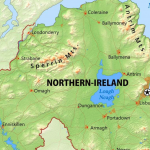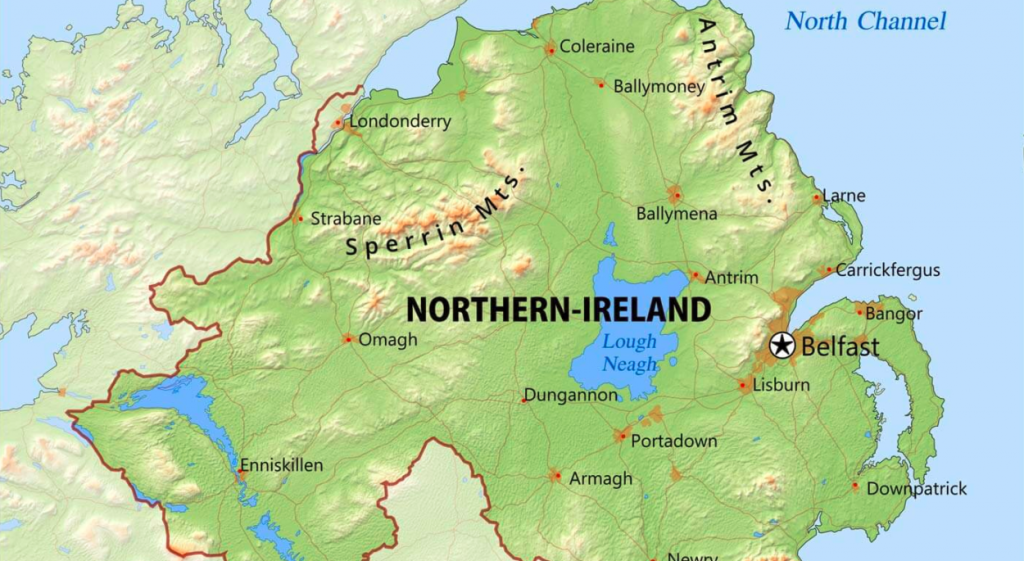Northern Ireland, Backstops and Law


So in my last blog I explained that “the UK has to choose between it’s obligations under the Good Friday Agreement, or it’s territorial integrity, or it’s desire to leave the Single Market and Customs Union.” After some conversation I had around this bit I thought it was worth expanding on.
A few weeks ago I had an entertaining and interesting exchange with a pal Cllr Glenn Jordan, on the other side of the political divide from me, about the implications of our various commitments in international law.
Glenn very much wanted to have some process for weighing up the UK’s various obligations under the Good Friday Agreement and the WTO to see what takes precedence believing that this would clear things up and make for an easier solution to the Norther Ireland backstop.
Indeed this is of course how domestic law, in a unitary system like a nation state happens. Because all law is part of the same ultimate legal system; with a final arbiter (In our case the Supreme Court) a big part of how the legal system works is weighing up different, competing obligations and rights to see what ultimately takes precedence. Some areas of law, like Human Rights are *principally* about the weighing of competing rights where they become mutually exclusive.
International law is quite, quite different. There is no equivalent of the “Supreme Court” able to hand down binding judgements in where the terms of various treaties clash (and indeed I imagine most who favour “leave” would be horrified at the prospect of such a supranational authority).
Bilateral treaties, and membership of international organisations usually have absolutes. The parties either agree to abide by them, seek agreement to change the terms of the treaty/organisation, or if they won’t they have to withdraw or leave.
In respect of Northern Ireland there are two obligations the UK has that are pertinent. The Good Friday agreement and our (and Eire/EU’s) membership of the WTO.
The GFA, put incredibly simply (not the place for a detailed analysis) allowed for those residents of N.Ireland who felt British to be British for all purposes, and those who felt Irish to be Irish for all purposes (this is a huuuuuuuuuuge simplification). Part of the underpinning of this is that the Republic of Ireland changed her constitution to formally renounce a territorial claim on Northern Ireland; and both Eire and the UK agreed to implement no border between the Republic and Northern Ireland.
This was underpinned by our shared membership of the EU (or more accurately our membership of the Single Market, and Customs union) which made such a borderless settlement possible.
Now it is very important to note that this obligation is on both parties; should one of the parties seek to change the underlying situation AND maintain their obligations under the treaty then it is incumbent upon them to propose a solution that allows this (more in that later).
The WTO requires it’s members to properly enforce their borders in respect of Trade. Another misnomer about this is enforcement stuff. I see a lot of leavers posting memes and suchlike saying “Senior WTO Officials confirm they won’t tell UK to enforce border”.
This is nonsense because the WTO isn’t a unitary legal authority. What happens with enforcement is that other countries where they believe you are in breach of the rules with can impose sanctions upon you. The reality is neither the Eire/EU or the UK would in practice not police a WTO border. The UK Attorney General recently made it clear that this is something the UK would have to do in a No Deal scenario.
What this all means is that if the UK wishes to fufil it’s obligations under the Good Friday Agreement, and virtually the entire political class in the UK claim that they wish to do this; then it limits the options available to the UK in terms of departure from the EU (or more pertinently the Single Market and Customs Union).
Assuming we stick to the GFA then the choice has always been that we either accept a border in the Irish Sea, with Norther Ireland in effect remaining in the Single Market and Customs Union; or a very close relationship with the EU in which the whole of the UK remains in the Single Market and Customs union.
To be clear this is eminently possible certainly from the EU’s side. They would be happy with a N.Ireland specific backstop (indeed it was the UK that rejected this as it crosses one of our redlines) or with the UK joining EFTA/EEA and Customs Union.
In fact, one of the things lost in all the huffing and puffing over the backstop since November is that it was the UKs idea. We suggested the current backstop as a Northern Ireland specific one crossed our redlines.
The problem the country has is our leaders, and Brexiteers, have not been honest about what the options are; and have complicated this with damaging and contradictory red lines.
The choice has always been that we can have any two of honouring the GFA, maintaining the territorial integrity of the UK and leaving the Single Market and Customs union. But we cannot have all three.
The backstop was a clever way of deferring the reality of this choice to a point in the future but that remains the choice we have, have always had, and will always have.
Withdraw from the GFA, or if not a Border in the Irish Sea, or if not that then UK stays in Customs Union and Single Market. As with so much of Brexit people have been promised easy simple solutions to complex often impossible situations.
This one is quite simple, even if it is unpalatable to people who have promised unicorns. And this choice will not go away, and it won’t change.
Common Market 2.0

As anyone who has spoken to me about politics, or read
anything I’ve written on the topic in the last few years will know I am far,
far from Jeremy Cobyn’s biggest fan. Furthermore I have repeatedly been pretty disappointed
with his, and Labour’s, positioning on Brexit both pre and post the vote in
2016.
But I have to say that I think the outrage from remainers over his meeting with
Nick Boles et al and the “Common Market 2.0” gang (that is EEA/EFTA + Custom’s
Union BTW) is both misplaced and misconceived and tactically the wrong thing
for Remainers to do.
Now I don’t, for a second, believe that Corbyn is in any
way working to try and stop Brexit. He wants it and everyone knows it. But in
terms of getting a good, or at least a “not as bad” outcome from Brexit
requires Remainers to, I think, be a little flexible.
Like most other die hard Remaoners I want Brexit stopped or cancelled; and
whilst I have distaste for referendums I kind of feel that what is enacted by
referendum can only be undone by referendum. Therefore my first choice, what I’m
“hoping for” is a People’s vote, May’s Deal vs Remain (hoping for probably a
misnomer, I dread it, just dread it less than any other option).
But the first rule of political realism is deal with the world as it is, not as
you wish it were. I frequently criticise the Unicorn hunting of the batshit
Brexiteers; and Unicorn hunting from those of us who hope to undo Brexit is
just as bad.
Here is the truth, barring a remarkable turnaround from the Government front
bench, and the Labour back benches there is very little likelihood of a People’s
vote getting through parliament. It won’t matter how Corbyn whips. It isn’t
impossible, and I’m not imploring anyone to give up on this idea. But the cold,
hard, facts are the Parliamentary arithmetic mean that delivering this is just
not within Corbyn’s gift, even if it was something he wanted to deliver (it clearly
isn’t).
In politics we all too often let impossible pursuit of the perfect mean that we
miss out on the merely good, or even just better (case in study the ERG, and I
suspect the Labour left). I know that my optimal outcome (Brexit stopped) is
unlikely. And I therefore think it is necessary to look at other solutions,
that may well be sub optimal.
For me the options are on a continuum of suitability and how damaging they will
be to the country. Stopping Brexit is the best option. If that cannot happen
then a close relationship along the lines of the Common Market 2.0 would be the
next best. Then May’s deal. Lastly “No Deal” is the most horrendously damaging
option that must be stopped and resisted at all costs.
The Common Market 2.0 (hereafter CM2) indeed does have some particular
advantages, that in some ways (but not overall) make it more appealing that
trying to stop Brexit.
Firstly (and this is a important) it probably, probably,
has the votes to actually be carried by parliament and therefore to resolve the
issue. If May’s deal get’s another thumping defeat next week (and all the
indications are that the Government is trying their very best to make that
happen) and No Deal is ruled out; then trying to find a solution that can
actually pass parliament will become very important.
Secondly the mandate from 2016. I’m deeply uncomfortable
with all this “will of the people” stuff; I think it is pretty obvious at least
some people have changed their minds, circumstances have changed, the
electorate has changed, and what is being offered now isn’t what was promised
in 2016 (not to mention that the honesty and integrity of the referendum is now
under serious question). But the truth is we had a vote; and in many ways by
having a solution that respects that, that discharges that mandate, then we
have a platform for actually moving forward and healing.
Whatever any leavers try to claim, CM2 would absolutely
discharge the mandate. It might not be exactly what some of the people who
voted leave thought they were voting for (though contemporaneous data seems to
suggest most leave voters thought we’d stay in single market at the time of the
referendum) but the question on the ballot paper was about us leaving the EU.
In CM2 we would unquestionably have left the EU and therefore the mandate,
however dodgy it is, would be discharged.
So those are the two ways in which CM2 would in some
respects have advantages over cancelling Brexit (at this stage). Of course
there are other benefits too CM2 would very neatly solve all of the very
difficult issues we have around Northern Ireland and the Good Friday agreement
(indeed it is the only solution that can do this AND maintain the territorial
integrity of the UK).
The backstop, and all it’s huffing and puffing is
basically a way of kicking into the long grass that the UK has to choose
between it’s obligations under the Good Friday Agreement, or it’s territorial integrity,
or it’s desire to leave the Single Market and Customs Union. We can only really
have any two out of three, and this uncomfortable reality is one which May is
reluctant to actually confront at this stage. Plumping for CM2 resolves that
little conundrum for us.
It would have the advantage of being exactly what
business wants if we are to leave and gives us the least bad exit in terms of
damaging the economy (important if we want an incoming Labour government to be
able to actually transform lives rather than just mitigating decline).
This one, this one is a biggie, it actually would “Just
make it stop” (which I suspect that 90% of the British public desperately want).
CM2 would require some negotiation and implementation. But as it would be using
largely “off the shelf” solutions, and would likely command cross party support
it would be able to be done *relatively* straightforwardly.
In contrast May’s deal, Labours fantasy Unicorn version
or No Deal is going to be the work of a generation to implement. Any of them
will consume our politics, economy, and legal system for the best part of a
decade. Combined with the much worse adverse effect on the economy that any of
these would have will be devastating for the British state, and ordinary
working people in particular. It also saves us from predatory action from Trump’s
America on trade and means we can duck that Chlorine Chicken.
I don’t think that CM2 is perfect, nor even optimal. It is basically pointless,
we leave, sort of, damage our economy but don’t get any of the imaginary
benefits that Brexit was supposed to bring (but never would have). But it discharges
the mandate, does so in a not particularly damaging way, let’s us move on and
do so quickish. It also offers a better platform for the UK to change it’s mind
down the line.
I do not think we are going to get a People’s vote, and
if we do it would be very difficult to win. So Common Market 2.0 might be the
least bad option. And it might be something that could actually be delivered. Remainers
ought to at least consider and not dismiss it.
Is a new referendum legit?

That old mantra of a week being a
long time in politics huh? Sheesh…..
So last night Labour have potentially committed to voting for a new
confirmatory referendum which looks based on the underlying situation to in
practice be for May’s deal (or variation thereof) and Remain. Labour will first
try to get it’s own vision for Brexit passed (which will fail) then pivot to
this position.
A couple of things first up. I do not believe that this position will pass even
if Labour whip for it. A much more likely outcome is that this takes “No Deal”
out. I now think the overwhelmingly most likely option is that May’s deal, or
some variation on it will pass.
My gut feeling is that when faced with no Brexit, or a referendum, the ERG will
fold, and there are sufficient quantities of Labour MPs determined to stop
either no Deal, or no Brexit that May will get over the line.
However should some version of a
referendum actually get through is this legitimate?
To be clear I’m not talking here
about the wisdom of holding another vote. There are of course strong arguments
for and against this. Nor am I talking about the prospects of how it will go.
I think it is worth slaying a profound
falsehood though. It is simply not true that a Peoples Vote would be a “second
referendum”, it would in fact be the third such referendum that the UK has
held. The UK held confirmatory referendums on our continued membership of “Europe”
in 1975 and in 2016. This is a matter of fact. If a PV happens it will be our
third confirmatory referendum.
The timing of such repeats, their
respective appropriacy, is of course open to debate. I suspect that everyone
would have their own criteria for if and when this should happen. The amount of
time that has passed, the closeness or the result, the extent of changed
circumstances, maybe the lawfulness or legitimacy of the previous vote.
Unless you believed and argued,
that it was in principle wrong to seek to overturn the 1975 referendum in 2016;
then you cannot credibly claim an in principle objection to a Peoples vote now.
If you want to claim not enough time has passed, that the situation hasn’t
changed sufficiently to warrant one now, or that the consequences of holding
one outweigh the benefits or that the vote was so decisive that there is not
possibility that people could have changed their minds then that is fine (I
disagree natch).
But that is an argument about timing and appropriacy, not about principle.
For what (little I suspect) it is
worth, in my clearly not humble opinion, a referendum can be justified even if
it may well be unwise and not change anything.
- The
result was very close, by nature a very close referendum does not settle an
issue as much as a decisive one. Inevitably it will come into question sooner
that if the result had been much clearer. Indeed the most prominent leave
campaigner, Nigel Farage, publicly claimed that a 52-48 result for leave would
not have settled the issue. - The
Brexit on offer (May’s deal or No Deal) is substantially different from what
was promised by both Vote Leave/Leave.Eu. And by main parties in 2017 General Election. What is
being proposed is quite literally not what people voted for in 2016. - Vote
Leave and Leave.EU cheated, in fact had the referendum been binding, and not
advisory, it would have been set aside. I realise our whole establishment want
to pretend this doesn’t matter but it sure makes me mad. - The
world has changed, particularly the rules based international order (specifically the WTO) is being
challenged by Trump and Putin, and the idea we were sold of Britain’s place in
the world is more specious now. - Talking
of Putin that a hostile foreign power tried to influence our Democracy, even if
we cannot be sure of the extent to which they were successful, clearly raises
some questions of legitimacy about the vote.
Similarly I think that in 2016
the amount of time that had passed, plus the degree to which the EU had changed
and developed since 1975 means I find it hard to argue against the fact that it
could be reasonable to see if people had changed their minds.
But the important point here is both of these are judgements about degrees; not
a question of principle. Either it is legitimate in principle for people to
seek to overturn the result of a previous referendum or it isn’t.
I dislike referendums; particularly
for very complex and nuanced issues like our membership or otherwise of the EU
(or indeed any involvement with complex international law). But despite my
(actually in principle!) objection to the use of referendums in this way the
cat is out of the bag.
I’ll leave you with this, any
referendum can either be Democratic; or it can be unchangeable. It cannot be
both. I choose democracy every time.










